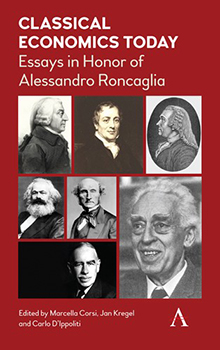
Research Topics
Publications on History of economic thought
-
Classical Economics Today: Essays in Honor of Alessandro Roncaglia
Book Series, March 2018 | March 2018Edited by Marcella Corsi, Jan Kregel, and Carlo D'Ippoliti
 Edited by Marcella Corsi, Sapienza University of Rome, Levy Institute Director of Research Jan Kregel, and Carlo D’Ippoliti, Sapienza University of Rome, this new collection of 16 essays is dedicated to Alessandro Roncaglia and deals with the themes that “have characterized his work or represent expressions of his personality, his interests and method," particularly his contributions to the interpretation of classical political economists as a means for informing present-day policy.
Edited by Marcella Corsi, Sapienza University of Rome, Levy Institute Director of Research Jan Kregel, and Carlo D’Ippoliti, Sapienza University of Rome, this new collection of 16 essays is dedicated to Alessandro Roncaglia and deals with the themes that “have characterized his work or represent expressions of his personality, his interests and method," particularly his contributions to the interpretation of classical political economists as a means for informing present-day policy.
Published by: Anthem Press -
The Neoclassicals’ Conundrum
Working Paper No. 893 | July 2017If Adam Smith Is the Father of Economics, It Is a Bastard Child
Neoclassical economists of the current era frequently pay lip service to Adam Smith’s theories to certify the validity of natural-laws-based, laissez-faire policies. However, neoclassical theories are fundamentally disconnected from Adam Smith’s notion of value, his understanding of the economic individual and their interactions in society, his methodology, and the field of study he afforded to political economy. Instead, early neoclassical economists parted ways with the theories of Adam Smith in an effort to construct economic laws that would validate the existing capitalist order as universal, natural, and harmonious.
Download:Associated Program:Author(s):Oscar Valdes Viera -
Veblen’s Institutionalist Elaboration of Rent Theory
Working Paper No. 729 | August 2012As the heirs to classical political economy and the German historical school, the American institutionalists retained rent theory and its corollary idea of unearned income. More than any other institutionalist, Thorstein Veblen emphasized the dynamics of banks financing real estate speculation and Wall Street maneuvering to organize monopolies and trusts. Yet despite the popularity of his writings with the reading public, his contribution has remained isolated from the academic mainstream, and he did not leave behind a “school.”
Veblen criticized academic economists for having fallen subject to “trained incapacity” as a result of being turned into factotums to defend rentier interests. Business schools were painting an unrealistic happy-face picture of the economy, teaching financial techniques but leaving out of account the need to reform the economy’s practices and institutions.
In emphasizing how financial “predation” was hijacking the economy’s technological potential, Veblen’s vision was as materialist and culturally broad as that of the Marxists, and as dismissive of the status quo. Technological innovation was reducing costs but breeding monopolies as the finance, insurance, and real estate (FIRE) sectors joined forces to create a financial symbiosis cemented by political-insider dealings—and a trivialization of economic theory as it seeks to avoid dealing with society’s failure to achieve its technological potential. The fruits of rising productivity were used to finance robber barons who had no better use of their wealth than to reduce great artworks to the status of ownership trophies and achieve leisure-class status by funding business schools and colleges to promote a self-congratulatory but deceptive portrayal of their wealth-grabbing behavior.
Download:Associated Program:Author(s): -
The Recycling Problem in a Currency Union
Working Paper No. 595 | May 2010The recycling problem is general, and is not confined to a multicurrency setting: whenever there are surplus and deficit units—that is, everywhere—adjustment in real terms can be either upward or downward. The question is, Which? An attempt is made to formulate the problem in terms of the European Monetary Union. While the problem seems clear, the resolution is not. It is proposed to engage the issue through a detour consistent with the Maastricht rules. Inadequate as this is, it highlights the limits of technical arrangements when governments are confronted with political economy—namely, the inability to set the rules of the larger game from within a set of axiomatically predetermined rules dependent on the fact and practice of sovereignty. Even so, an attempt at persuasion through clarification of the issues—in particular, by highlighting the distinction between recycling and transfers—may be a useful preliminary. Some of the paper’s evocations, notably on oligopoly, may be taken as merely heuristic.Download:Associated Programs:Author(s):G. E. Krimpas
